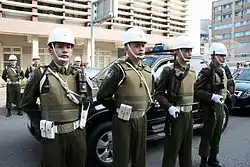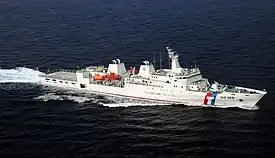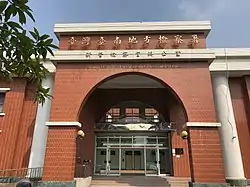Law enforcement in Taiwan
Law enforcement in Taiwan (officially the Republic of China) operates primarily through governmental police agencies.
History
Japanese colonial period
In the early days of Japanese colonial rule police were deployed to the cities to maintain order, often through brutal means, while the military was deployed to the countryside as a counterinsurgency and policing force. The brutality of early Japanese policing backfired and often inspired rebellion and insurrection instead of quashing it. This system was reformed by Goto Shinpei who sought to co-opt existing traditions to expand Japanese power. Out of the Qing baojia system he crafted the Hoko system of community control. The Hoko system eventually became the primary method by which the Japanese authorities went about all sorts of tasks from tax collecting, to opium smoking abatement, to keeping tabs on the population. Under the Hoko system every community was broken down into Ko, groups of ten neighboring households. When a person was convicted of a serious crime, the person's entire Ko would be fined. The system only became more effective as it was integrated with the local police.[1]
Under Goto Shinpei police stations were established in every part of the island. Rural police stations took on extra duties with those in the aboriginal regions operating schools known as “savage children’s educational institutes” to assimilate aboriginal children into Japanese culture. The local police station also controlled the rifles which aboriginal men relied upon for hunting as well as operated small barter stations which created small captive economies.[1]
Police
.jpg.webp)
Most actual law enforcement and day-to-day policing duties are delegated to local police departments on a city and county level which answer to the NPA but are considered agencies of their local government. However the NPA has direct control over several specialized units which may be deployed to assist local forces, as well as the national highway patrol.
Unlike the police system in the United States, the central government appoints the head positions of city and county Police Departments in the ROC and thus forms a solid chain of command for all police personnel. By calling a personnel review board, the Director-General of NPA has the full control of personnel rotation and transfer,[2] as well as administrative commendations and reprimands over all high ranking police officers, including chiefs of local police departments.[3]
Military Police

ROCMP is responsible for enforcing military law, maintaining military discipline, providing manpower support for the civilian police force, performing combat duty in times of emergency, providing security for certain governmental facilities such as including the Presidential Office Building, and performing counter-terrorism and VIP protection operations. It is also responsible for the defense of Taipei, the capital city and political and financial center of the Republic of China.
In accordance with; Clause 2, Section 1 of Article 229; Clause 2, Section 1 of Article 230; and Clause 2, Section 1 of Article 231 of The Criminal Procedure Code of the ROC, the commissioned and non-commissioned officers, and the enlisted persons of the MP Corps have the authority to assist public prosecutors or to be commanded by prosecutors to investigate crime activities. In the other words, performing the authority of Judicial Police are given by The Criminal Procedure Code of the ROC to the Security MP troops in the regional Military Police units, and it is the same in nature as the police performing the actual criminal investigations. Before the establishment and expansion of the mobile forces of special police corps in the ROC, Military Police troops were the main force to secure and prevent high-profile criminal activities, heavy violence, and frequent society disorders or riots. At present, Military Police troops are still aggressively working with and commanded by the district public procurator systems to investigate criminal cases. The Security MP troops are still one of the important forces that uphold the law and order of society in the Republic of China.
Justice Investigation and National Security
Regarding drugs, corruptions, espionage, and economic crimes, the Investigative Bureau of Ministry of Justice (MJIB) has developed stronger capability to cover cases in those categories for decades. The investigation of these cases, police corruption included, are usually transferred to or led by the Bureau of Investigation.
Historically, counter-intelligence affairs are under the turf of MJIB. Different from "special branch" in the police system in United Kingdom, the security divisions at all levels of Taiwan police system are mainly staff units, not fielded police details. Under the supervision of National Security Bureau, all non-mililary cases of espionage would soon be moved to the Bureau of Investigation.
Coast Guard

Smuggling and arms trafficking has been a long been an issue in Taiwan. Human-trafficking and its counterpart, prostitution, are increasingly serious problems in Taiwan. The maritime patrol of the Coast Guard Administration have the responsibility to stop those crimes at sea, and the coastal patrol of Coast Guard Administration are responsible for intercepting such criminal cases along the coast of Taiwan. The in-land territory of Taiwan should be the responsibility of individual local police departments or national law enforcement units from the NPA or MJIB.
Cases like smuggling and human-trafficking may cause turf wars between competing law enforcement agencies. In some examples, when brothels were raided by plain-clothes peace officers, the pimp would quietly go to the local police station and gather possible information about his girls in detention, but sometimes the pimp would later find that his girls were held up by the local coastal patrol units.
Public Prosecutor

The duty of the Prosecutor is to represent Government to investigate crime and to expose or reveal conspiracies or secrets, as well as to preserve the justice and fairness of a society. In criminal procedure, prosecution authorities are placed in all courts according to the Court Organic Act (法院組織法) to develop the rules of criminal procedure trial level function.
See also
References
![]() This article incorporates public domain material from the Library of Congress Country Studies website http://lcweb2.loc.gov/frd/cs/.
This article incorporates public domain material from the Library of Congress Country Studies website http://lcweb2.loc.gov/frd/cs/.
- Crook, Steven. "Highways and Byways: Handcuffed to the past". www.taipeitimes.com. Taipei Times. Retrieved 7 December 2020.
- 明遠 (2001-02-16). 職位調動因人而異 拉警報 (in Chinese). New Taiwan News Weekly. Archived from the original on 2007-05-10. Retrieved 2007-04-17.
- "National Police Administration - Taiwan Intelligence and Security Agencies". GlobalSecurity.org. Retrieved 2006-03-08.
External links
 Media related to Police of Taiwan at Wikimedia Commons
Media related to Police of Taiwan at Wikimedia Commons